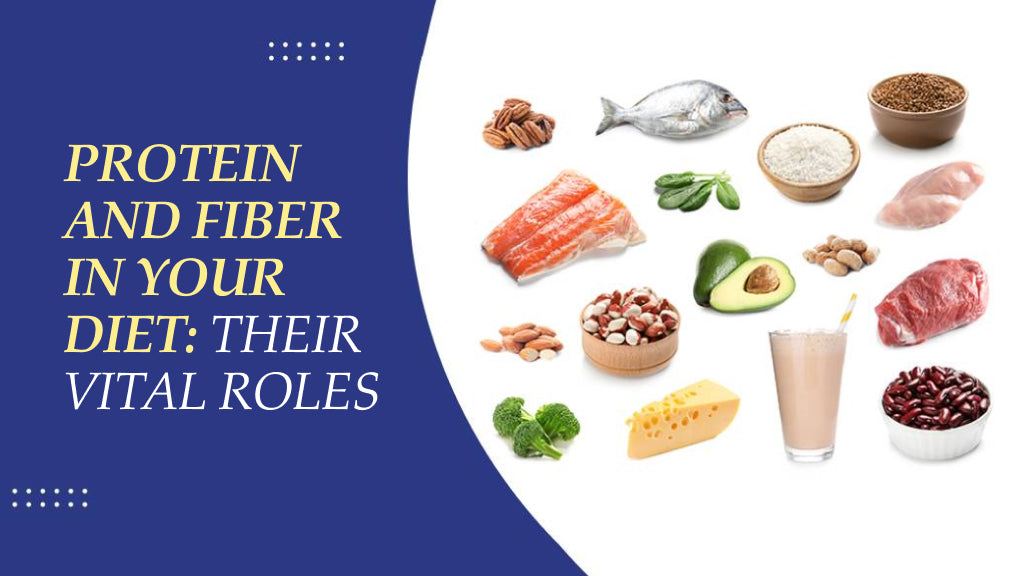
The Importance Of Protein And Fiber In Your Diet
In the world of nutrition, two essential components often take center stage: protein and fiber. These dietary elements play pivotal roles in maintaining overall health and well-being. From muscle growth and repair to digestive health and weight management, protein and fiber are crucial for a balanced and nutritious diet.
In this comprehensive exploration, we will delve into the significance of these nutrients, their sources, recommended daily intake, and the myriad benefits they offer.
1: Protein: The Building Blocks of Life
Protein is often referred to as the "building block" of life, and for a good reason. It is an essential macronutrient that plays a central role in the structure, function, and regulation of the body's tissues and organs.
Proteins are composed of amino acids, which are the basic units of protein molecules. These amino acids are responsible for various critical functions in the body, including the synthesis of enzymes, hormones, and neurotransmitters.
2: Sources of Protein
Protein and fiber foods can be found in a wide variety of foods, both animal-based and plant-based. Animal sources of protein include meat, poultry, fish, eggs, and dairy products. These sources are considered "complete proteins" because they provide all the essential amino acids the body needs.
Plant-based sources of protein include legumes (beans, lentils, and peas), tofu, tempeh, nuts, seeds, and whole grains. While plant-based proteins may lack some essential amino acids, combining different plant-based protein sources in a meal can provide a complete amino acid profile.
3: Recommended Daily Intake
The recommended daily intake of protein varies depending on factors such as age, sex, activity level, and overall health. In general, adults should aim to get about 10-35% of their daily caloric intake from protein.
The Dietary Reference Intake (DRI) suggests a daily protein intake of approximately 0.8 grams of protein per kilogram of body weight for sedentary adults.
However, athletes, individuals engaged in intense physical activity, and those recovering from injuries may require more protein to support muscle growth and repair.
Benefits of Protein
1: Muscle Growth and Repair
Protein is essential for the growth and repair of muscle tissues. When you engage in physical activities like weightlifting or resistance training, protein intake becomes crucial for muscle recovery and growth.
2: Weight Management
Including protein-rich foods in your diet can help you feel fuller for longer periods, which can aid in controlling your appetite and reducing overall calorie intake. This, in turn, can support weight management and weight loss goals.
3: Hormone Production
Proteins play a vital role in the production of hormones, including insulin, which regulates blood sugar levels, and growth hormones, which are essential for overall development.
4: Enzyme Function
Many enzymes in the body are protein-based and are involved in various metabolic processes, including digestion, energy production, and detoxification.
5: Immune Support
Antibodies, which are crucial for immune function, are composed of proteins. Adequate protein intake supports the production of antibodies and strengthens the immune system.
6: Skin, Hair, and Nail Health
Collagen, a protein, is responsible for the health and elasticity of your skin. Proteins also contribute to the strength and growth of hair and nails.
7: Transport and Storage of Nutrients
Certain proteins, like hemoglobin, help transport oxygen in the blood, while others, like ferritin, store iron for later use.
8: Fiber: The Digestive Dynamo
Fiber is another vital component of a balanced diet, though it does not provide calories like protein, carbohydrates, and fats. Instead, it serves as a complex carbohydrate that the body cannot digest. Despite being indigestible, fiber plays a crucial role in promoting digestive health and overall well-being.
9: Sources of Fiber
Fiber is primarily found in plant-based foods, including fruits, vegetables, whole grains, legumes, nuts, and seeds. There are two main types of dietary fiber: soluble and insoluble.
10: Soluble Fiber
This type of fiber dissolves in water and forms a gel-like substance in the digestive tract. Sources of soluble fiber include oats, barley, beans, lentils, fruits (e.g., apples, citrus fruits), and vegetables (e.g., carrots, sweet potatoes).
11: Insoluble Fiber
Insoluble fiber does not dissolve in water and adds bulk to the stool, promoting regular bowel movements. Whole grains, vegetables (e.g., broccoli, cauliflower), and the skins of fruits are good sources of insoluble fiber.
Recommended Daily Intake
The recommended daily intake of fiber varies based on age, sex, and energy requirements. In general, adults should aim to consume between 25-38 grams of fiber per day. However, most people fall short of meeting these recommendations. A diet rich in fruits, vegetables, whole grains, and legumes can help individuals increase their fiber intake.
Benefits of Fiber
1: Digestive Health
Fiber is well-known for its role in promoting regular bowel movements and preventing constipation. It also helps prevent diverticulitis and hemorrhoids.
2: Weight Management
High-fiber foods tend to be filling, which can help control appetite and reduce calorie intake. Additionally, fiber-rich foods often require more chewing, leading to a slower eating pace and improved portion control.
3: Blood Sugar Control
Soluble fiber can slow the absorption of sugar, which helps stabilize blood sugar levels and may reduce the risk of type 2 diabetes.
4: Heart Health
Fiber can help lower LDL (bad) cholesterol levels, reducing the risk of heart disease. It may also help lower blood pressure.
Final Verdict
In conclusion, the importance of protein and fiber in your diet cannot be overstated. These two essential nutrients are the cornerstones of a healthy and balanced eating plan. Protein serves as the building blocks for our body, supporting muscle growth, immune function, and various metabolic processes.
On the other hand, fiber promotes digestive health, aids in weight management, and contributes to heart health. Combining protein and fiber in your meals can provide a powerful nutritional punch, ensuring that you not only meet your dietary needs but also enjoy a multitude of health benefits.
So, whether you're an athlete striving for peak performance or simply looking to enhance your overall well-being, incorporating protein and fiber into your daily diet is a smart and nutritious choice.
